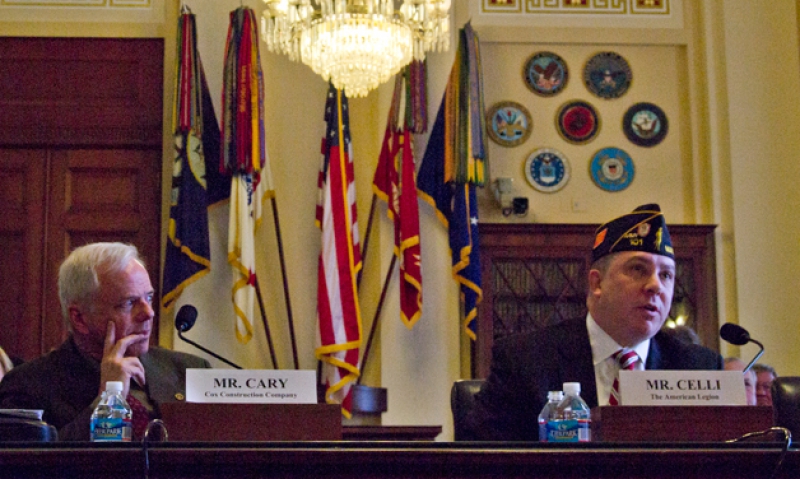
Fed auctions bad for vet business, says Legion
In congressional testimony on Dec. 11, American Legion Legislative Director Lou Celli characterized a commonly employed government buying process as unfair and even harmful to veteran-owned small businesses. Celli appeared at a joint hearing of two U.S. House subcommittees examining the practice of utilizing "reverse auctions" in federal agency acquisitions.
Government reverse auctions are those in which a federal agency, such as the Department of Veterans Affairs, solicits a series of bids for needed good or services from vendors in an online auction setting. Critics claims that reverse auctions are do not necessarily provide the government with the financial savings for which they were designed since bidders – the would-be suppliers of goods and services to government – have little if any incentive to offer their best price up front, or ever. Also, the practice has become so unpopular among some vendors that single-bidder reverse auctions are not unheard of, thus providing no competitive bids for the government buyer to consider. Reportedly, many construction companies are especially wary of reverse auctions since they must consider the sometimes undisclosed complexity of a job, plus the expense of supplies, materials and subcontracting, before making an intelligent and informed bid on a project. Critics also argue that reverse auctions can deliver inferior results since only price is considered by the buyer in this scenario, rather than overall value intrinsic in the bidder’s experience, commitment to quality and proven efficiency and expediency.
Celli’s testimony dealt with reverse auctions from the veteran owned small business (VOSB) and service-disabled veteran-owned small business (SDVSOB) points of view. He said the reverse auction practice discourages the profits that are especially critical to the survival and prosperity of small businesses such as VOSBs and SDVOSBs who have limited resources.
"The only real argument for using (reverse auctions) is ‘to drive prices down’," Celli said. "Since small business accounts for almost 90 percent of all reverse auction bidders, it’s the small businesses who are suffering the most."
Celli went on to register the opinions of reverse auctions expressed by veteran business owners, including members of The American Legion Small Business Task Force. "The American Legion works with hundreds of veteran business owners and has consistently received negative reports regarding the reverse auction process," he said. "The most common comment we hear is that the process is unfair, deceptive, and fraught with cheaters. This is not a characterization by The American Legion as to the quality of reverse auction services. It is only offered as a perspective of what the overwhelming opinion is regarding reverse auctions.
"From our research, we have found that the No. 1 problem with the reverse auction system is that it poises the federal government in a predatory position, and without a highly skilled and highly ethical oversight mechanism in place to ensure the government isn’t being wrongly enriched by creating an overbearing procurement process, then reverse auctions are a recipe for disaster."
Celli also criticized the process as encouraging small businesses to underbid while in the heat of a fast-paced auction, thus ultimately harming themselves financially, and being coerced into selling their goods and services below fair-market value. "The only way to make the process fair is to guarantee that the federal government is statutorily prohibited from purchasing goods or services through the reverse auctions process, below fair market value," said Celli.
In written testimony submitted to the House Committee on Veterans’ Affairs Subcommittee on Oversight & Investigations and the House Committee on Small Business Subcommittee on Contracting & the Workforce, Celli stated, "While reverse auctions may have a place in federal procurement in a limited capacity, The American Legion believes that the federal contracting office has the primary responsibility to ensure that every product that the government spends tax payer dollars on is purchased at fair market value. This assurance protects the tax payer, the small business, and the market."
Celli also wrote, "The American Legion is extremely concerned that reverse auctions will lead to decreased quality and decreased employment opportunities for veterans, which is in direct violation of American Legion Resolution No. 50 that supports more hiring opportunities for veterans. " In his written testimony, Celli also referenced Legion Resolution No. 321 supporting "reasonable set-aside of federal procurements and contracts for business owned and operated by veterans.
In oral testimony near the conclusion of the two-hour hearing, Department of Veterans’ Affairs’ Veterans’ Health Administration (VHA) deputy under secretary Jan Frye said, "VA supports the use of reverse auction(s) as an acquisition tool…primarily limited to contractor support for VHA", but noted that the process has not been problem free. "Early in fiscal year 2012, concerns surfaced regarding management of the reverse auction process,’ he said. "As a result, VA…made the decision to invoke a moratorium and conduct a comprehensive evaluation of VA’s current compliance with policy and regulations." The moratorium lasted one month, March 3 to April 3, 2012.
Frye noted that VA is again "pausing further utilization of our reverse auction tool. We are assessing the degree to which we can ensure a consistent application of this solicitation method, which includes thorough documentation and conforms to all aspects of VA policy. The department will continue to procure products and services through other procurement methods."
In his closing remarks, Congressman Richard Hanna, who chaired the hearing, stated that the month-long moratorium on reverse auctions imposed by VA in 2012 was lifted due to "political pressure." He did not cite the source of that pressure.
